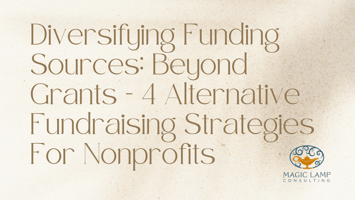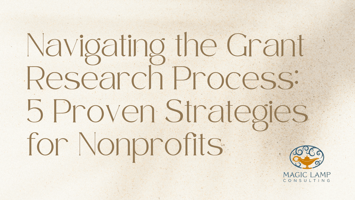Nonprofit organizations play a vital role in addressing social issues and creating positive change...
Effective Ways to Secure New Nonprofit Funding

Securing new ways of funding is especially important for nonprofits as it ensures financial stability, resilience, and the ability to fulfill their missions over the long term. Diversifying revenue streams reduces vulnerability to fluctuations in specific funding channels and enhances the organization's capacity for program expansion and innovation. Moreover, diverse funding attracts community support, builds credibility, and facilitates swift responses to urgent needs or unforeseen opportunities. By actively seeking varied funding sources, nonprofits ensure their financial sustainability and strengthen their position to adapt, grow, and sustain a sustained positive impact on the communities they serve. In this blog post, the Magic Lamp Consulting team will explore various effective ways nonprofits can secure new funding.
Grants:
Grants are a common and essential source of funding for nonprofits. They come from government agencies, foundations, and corporations aligned with the organization's mission. To tap into this resource effectively, nonprofits should:
- Research thoroughly: Identify grant opportunities that align with your organization's goals and activities. Use online databases, networking, and grantmaker websites to find potential matches.
- Craft compelling proposals: Develop well-researched and persuasive grant proposals that clearly articulate your nonprofit's mission, objectives, and how the funds will be used to create a positive impact. Highlight measurable outcomes to demonstrate accountability.
- Build relationships: Establishing connections with grantmakers through networking events, conferences, and meetings. Building relationships can increase the likelihood of your proposal being considered and funded.
Individual Donations:
Individual donors form the backbone of many successful nonprofits. Cultivating a strong relationship with individual donors involves:
- Storytelling: Share impactful stories that highlight the difference their contributions can make. Personalize the donation experience by connecting donors to the people and communities their support benefits.
- Donor stewardship: Implement effective donor stewardship practices to express gratitude and keep donors engaged. Regularly update them on the organization's achievements and how their contributions are making a difference.
- Online fundraising campaigns: Leverage digital platforms to reach a wider audience. Use social media, email campaigns, and crowdfunding to engage potential donors and make it easy for them to contribute.
Sponsorships:
Sponsorships provide a unique opportunity for nonprofits to establish mutually beneficial partnerships with businesses and corporations. To secure sponsorships successfully:
- Identify potential sponsors: Look for businesses with a common interest or mission with your organization. Develop a list of potential sponsors and tailor your sponsorship proposals to highlight the benefits for both parties.
- Offer value: Clearly articulate the benefits of sponsoring your nonprofit, such as brand visibility, positive public relations, and alignment with corporate social responsibility goals. Make it a win-win scenario for sponsors.
- Recognition and appreciation: Acknowledge sponsors in your communications, events, and promotional materials. Ensure that sponsors feel appreciated and recognized for their support.
Major Gifts/Donor Events:
Major gifts and donor events provide an opportunity to engage with high-net-worth individuals and build long-term relationships. To secure major gifts and successfully host donor events:
- Identify potential major donors: Conduct prospect research to identify individuals with the capacity and interest to make significant contributions. Develop a personalized approach for each potential major donor.
- Host exclusive events: Organize events that provide major donors a unique and exclusive experience. These events could include private dinners, behind-the-scenes tours, or exclusive briefings on the organization's impact.
- Create a compelling case for support: Clearly articulate the impact major gifts can have on your organization's ability to achieve its mission. Showcase specific projects or initiatives that align with the donor's interests and values.




